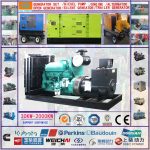Diesel Generators for Base Load Power A Comprehensive Guide
Introduction Diesel generators have been a popular choice for providing base load power in various industries and applications due to their reliability, efficiency, and versatility. In this article, we will delve into the details of diesel generators, their working principles, advantages and disadvantages, as well as their role in serving as a reliable source of base load power. Understanding https://www.lkpowerplant.com/product/special-offer-reliable-high-power-200kw-efficient-diesel-generator-set-for-industrial-use/ are a type of internal combustion engine that uses diesel fuel to generate electricity. They consist of a diesel engine, an alternator, a fuel system, a cooling system, and a control panel. Diesel generators are commonly used in various applications such as commercial buildings, industrial facilities, hospitals, data centers, mining operations, and telecommunications infrastructure. Working Principles of Diesel Generators The working principles of diesel generators are relatively simple yet effective. When the generator is started, the diesel engine is activated, which drives the alternator to produce electricity. The alternator converts mechanical energy from the engine into electrical energy through the process of electromagnetic induction. The electricity generated is then distributed to power electrical loads connected to the generator. Advantages of Diesel Generators for Base Load Power 1. Reliability: Diesel generators are known for their reliability and durability, making them a preferred choice for base load power applications where a continuous and uninterrupted power supply is essential. 2. Fuel Efficiency: Diesel engines are more fuel-efficient compared to gasoline engines, resulting in lower fuel consumption and operational costs over the long term. 3. Longevity: Diesel generators have a longer lifespan and require less maintenance compared to other types of generators, making them a cost-effective solution for base load power generation. 4. Quick Start-Up: Diesel generators can start up and reach full power capacity within seconds, providing immediate power in case of power outages or emergencies. 5. Flexibility: Diesel generators can be easily integrated into existing power systems and can be used as a standalone power source or in parallel with other generators for increased capacity. Disadvantages of Diesel Generators for Base Load Power 1. Environmental Impact: Diesel generators produce emissions such as nitrogen oxides (NOx) and particulate matter, which can contribute to air pollution and have negative environmental effects. 2. Noise and Vibration: Diesel generators can be noisy and produce vibrations during operation, which may be a concern in noise-sensitive environments or residential areas. 3. Fuel Storage: Diesel fuel requires proper storage and handling to prevent contamination and ensure its quality, adding complexity to the operation of diesel generators.  4. Initial Cost: Diesel generators have a higher upfront cost compared to other types of generators, which may be a barrier for some users looking to invest in base load power solutions. Role of Diesel Generators in Base Load Power Diesel generators play a crucial role in providing base load power, which refers to the continuous and constant supply of electricity needed to meet the minimum power requirements of a facility or operation. Base load power is essential for maintaining critical operations, powering essential equipment, and ensuring uninterrupted operation of various processes. In industries such as manufacturing, healthcare, telecommunications, and data centers, where downtime can result in significant financial losses and operational disruptions, diesel generators are relied upon to provide base load power and backup power in case of grid outages or emergencies. Diesel generators can be sized and configured to meet the specific power requirements of a facility, ensuring a reliable and uninterrupted power supply at all times. Conclusion Diesel generators are a versatile and reliable solution for providing base load power in various industries and applications. With their numerous advantages such as reliability, fuel efficiency, longevity, and quick start-up, diesel generators are well-suited for meeting the continuous power demands of critical operations and facilities. While there are some disadvantages such as environmental impact, noise, and initial cost associated with diesel generators, their benefits outweigh the drawbacks in many cases. Overall, diesel generators play a vital role in ensuring a stable and uninterrupted power supply, making them a preferred choice for base load power generation.
4. Initial Cost: Diesel generators have a higher upfront cost compared to other types of generators, which may be a barrier for some users looking to invest in base load power solutions. Role of Diesel Generators in Base Load Power Diesel generators play a crucial role in providing base load power, which refers to the continuous and constant supply of electricity needed to meet the minimum power requirements of a facility or operation. Base load power is essential for maintaining critical operations, powering essential equipment, and ensuring uninterrupted operation of various processes. In industries such as manufacturing, healthcare, telecommunications, and data centers, where downtime can result in significant financial losses and operational disruptions, diesel generators are relied upon to provide base load power and backup power in case of grid outages or emergencies. Diesel generators can be sized and configured to meet the specific power requirements of a facility, ensuring a reliable and uninterrupted power supply at all times. Conclusion Diesel generators are a versatile and reliable solution for providing base load power in various industries and applications. With their numerous advantages such as reliability, fuel efficiency, longevity, and quick start-up, diesel generators are well-suited for meeting the continuous power demands of critical operations and facilities. While there are some disadvantages such as environmental impact, noise, and initial cost associated with diesel generators, their benefits outweigh the drawbacks in many cases. Overall, diesel generators play a vital role in ensuring a stable and uninterrupted power supply, making them a preferred choice for base load power generation.